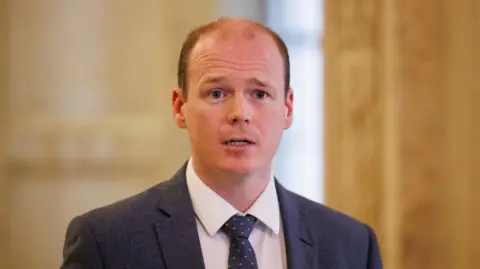In recent events, Northern Ireland has witnessed significant turmoil following a controversial Facebook post made by Communities Minister Gordon Lyons. This ministerial misstep, which has drawn considerable criticism, coincided with civil unrest in the region, particularly in Ballymena, where clashes prompted local authorities to temporarily relocate migrant families to the Larne Leisure Centre.
On Wednesday, as civil unrest escalated, the decision was taken to move families from Ballymena to Larne for safety. Regrettably, this facility was subsequently vandalized and set ablaze by rioters. Lyons, a member of the Democratic Unionist Party (DUP), contended that he did not disclose sensitive information regarding the use of the leisure centre. His assertion aimed to counter claims from political adversaries demanding his resignation, notably from Sinn Féin’s Finance Minister John O’Dowd, who criticized him for allegedly failing to demonstrate leadership during this crisis.
Northern Ireland Secretary Hilary Benn weighed in on the incident, suggesting that Lyons ought to reconsider the implications of his remarks, which he believed did not help the escalating situation. The Green Party also joined the chorus of critics, urging Lyons to resign in light of his comments.
The DUP leader, Gavin Robinson, defended Lyons on BBC Radio Ulster, asserting that the minister had been misrepresented and that his comments had been distorted for political gain. Robinson pointed out that the public was generally aware of the situation and that the leisure centre had been openly identified as a refuge for those displaced by the violence.
From a procedural standpoint, the situation escalated further as the Committee for Communities voted on a no-confidence motion against Lyons. This motion was proposed by Sinn Féin MLA Maolíosa McHugh, who argued that the minister’s comments implied a need for party consultation prior to establishing shelters for those in distress.
Criticism continued to mount with Justice Minister Naomi Long emphasizing that by publicly naming the refuge, Lyons had compromised the safety of those involved. The political interruption spurred by Lyons’ post was termed “reckless” by Alliance MLA Danny Donnelly, who was present at the leisure centre during the unrest.
As the situation unfolded, the police faced significant challenges in managing the unrest, with projectiles such as fireworks and bottles being hurled at officers during confrontations. Meanwhile, damage to the Larne Leisure Centre was categorized as significant, predominantly concentrated in the reception area, but with substantial smoke damage elsewhere.
Despite the backlash, Lyons maintained that the information he disclosed was already in the public domain and confirmed by the local council’s announcements. He stressed that his intent was to clarify rumors suggesting that the centre would serve as a permanent refuge, asserting his attempts to mollify the situation while condemning the violence against the facility.
In further developments, the DUP leader underscored that there was no justification for Lyons to resign, affirming his confidence in the minister and dismissing accusations aimed at portraying Lyons as having inadvertently disclosed the location of vulnerable individuals. Robinson criticized critics of Lyons as politically motivated detractors obstructing factual clarity.
In conclusion, the tumultuous events surrounding the Larne Leisure Centre have underscored the frail political dynamics in Northern Ireland, where the interplay between public safety, political discourse, and social unrest has created a challenging atmosphere for leaders like Gordon Lyons. As various factions continue to vie for political leverage amid public discontent, the focus remains on ensuring safety and effective leadership during a critical time in the region.



